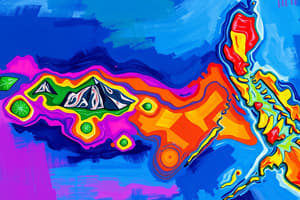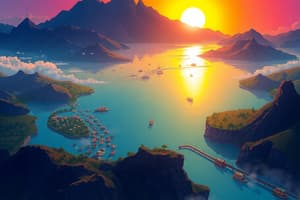Podcast
Questions and Answers
What characterized the pre-colonial societies in the Philippines?
What characterized the pre-colonial societies in the Philippines?
Pre-colonial societies in the Philippines were highly diverse and organized into various indigenous groups, each with its own distinct culture, language, and customs.
What are the main geographical features of the Philippines?
What are the main geographical features of the Philippines?
The main geographical features include mountains, volcanoes, plains, and a vast coastline.
How many islands make up the Philippines?
How many islands make up the Philippines?
The Philippines consists of more than 7,000 islands.
How did islands and waterways contribute to trade in the Philippines?
How did islands and waterways contribute to trade in the Philippines?
What was the impact of the fragmented geography on local cultures in the Philippines?
What was the impact of the fragmented geography on local cultures in the Philippines?
How did mountainous terrain contribute to the isolation of communities in the Philippines?
How did mountainous terrain contribute to the isolation of communities in the Philippines?
What role did volcanoes play in the Philippines' geography?
What role did volcanoes play in the Philippines' geography?
What geographical feature provided a natural defense for certain communities in the Philippines?
What geographical feature provided a natural defense for certain communities in the Philippines?
Flashcards are hidden until you start studying
Study Notes
Pre-Colonial Societies in the Philippines
- Pre-colonial societies were characterized by organized societies with their own systems of government, social structures, and economies.
- They were also marked by a strong sense of community and social hierarchy.
Geographical Features of the Philippines
- The Philippines is an archipelago composed of 7,641 islands, with ** Luzon** and Mindanao being the two largest islands.
- The country is located in Southeast Asia, bounded by the Pacific Ocean to the east, the South China Sea to the west, and the Celebes Sea to the south.
- The Philippines is also home to numerous mountain ranges, including the Sierra Madre, Cordillera, and Zambales.
- The country is volcanic in origin, with over 20 active volcanoes, including Mayon Volcano, Taal Volcano, and Mount Pinatubo.
Impact of Geography on Trade and Local Cultures
- The Philippines' islands and waterways contributed to the development of trade networks, with many communities engaging in maritime trade.
- The fragmented geography of the Philippines contributed to the development of distinct local cultures, with each community having its own unique customs, traditions, and languages.
- Mountainous terrain isolated many communities, contributing to the preservation of local cultures and the development of unique ethnic identities.
Role of Volcanoes and Natural Defense
- Volcanoes played a significant role in shaping the Philippines' geography, with volcanic eruptions creating fertile soil and enhancing the country's biodiversity.
- The mountainous terrain provided a natural defense for certain communities, protecting them from external threats and allowing them to maintain their independence.
Studying That Suits You
Use AI to generate personalized quizzes and flashcards to suit your learning preferences.




